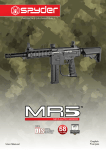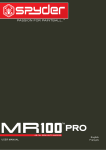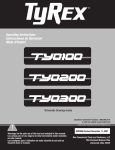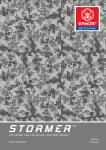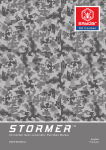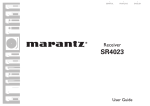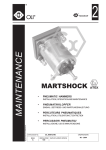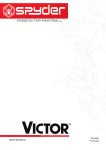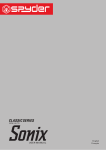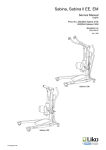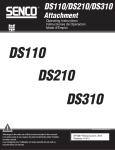Download USER MANUAL English Français .68 Caliber Semi-Automatic
Transcript
.68 Caliber Semi-Automatic Paintball Marker USER MANUAL English Français English . 6 8 C a l i b e r S emi-Automatic Paintball Marker TABLE OF CONTENTS IMPORTANT SAFETY GUIDELINES 1 OPERATION GUIDE / START UP 2 8 STEPS TO START AND PLAY 3-4 CO2 / COMPRESSED AIR TANK WARNINGS 5 INSTALLING A CO2 / COMPRESSED AIR TANK 5-6 PROPER USE OF YOUR BARREL BLOCKING DEVICE 6 INSTALLING / REMOVING A PAINTBALL LOADER 6 INSTALLING / REMOVING A SHOULDER STOCK 7 VELOCITY ADJUSTMENT INCREASE/DECREASE 7 A JAMMED PAINTBALL IN THE BREACH 7 HOW TO CLEAN THE MARKER 8 DISASSEMBLE / REASSEMBLE AND CLEANING OF REAR INTERNALS 8-9 CUP SEAL REMOVAL GUIDE 9-10 TROUBLESHOOTING 10 MR4™ PARTS LIST 11 MR4™ SCHEMATIC 12 WARRANTY STATEMENT 13 English IMPORTANT SAFETY GUIDELINES WARNING • • • • • • • • • • • • • • • • • • • • • • • • 1 This paintball Marker is NOT a toy. Misuse can cause serious injury or death. Kingman recommends that the customer be at least 18 years of age to purchase this product. Person under 18 years of age must have adult supervision when using this product. Read this User manual before using this product. Any modifications or tampering of original factory parts or use non authorized aftermarket accessories will void all warranties and liabilities from Kingman. Keep the barrel blocking device on Marker when not shooting/playing. To ensure proper adjustment of velocity Feet Per Second (fps), Kingman strongly recommends using a chronograph for paintball use located or purchased at most paintball stores and paintball fields. The discharges of paintballs are high velocity and high impact that can cause serious injuries or death if misused. Before/after use of the Marker, check and make sure all screws are securely tightened. Loose screws may prevent the Marker from functioning properly. A paintball Marker NOT properly maintained can be dangerous and can cause serious injury or death. Any person using this product or within range of this product while it is in use MUST wear EYES/ FACE, EARS PROTECTION designed specifically for the sport of paintball. This includes, but is not limited to, performing a maintenance/velocity check and during target practice. Kingman reminds the user that SAFETY IS YOUR RESPONSIBILITY. Protect your eyes/face and ears at all times. Kingman will not be held liable for injuries or death sustained when failing to follow the safety guidelines. Never shoot or point your Marker at a person that is not in a designated paintball facility and without proper paintball EYES/FACE/EARS PROTECTION. The protection includes and not limited to the protection of eyes, face, ears, neck and head. Avoid shooting underneath the paintball goggles. DO NOT point or shoot at any Law Enforcement Officer. DO NOT remove the Blaze Orange Muzzle Tip. This identifies the paintball marker is NOT a firearm. Treat every paintball Marker as if it were loaded. Never look down the barrel of a loaded or unloaded Marker. Always keep the paintball Marker in SAFE MODE until ready to operate. Always remove the air source and all paintballs from the Marker, includes paintballs inside the breach of the Marker, before disassembly. Fire only .68 caliber paintballs with this product. The use of any foreign objects will VOID all warranties and liabilities from Kingman. Always make certain the bolt of the Marker is in the un-cocked position when not shooting/playing. Using a paintball Marker outside of a non designated paintball field can be illegal, and is subject to law enforcement penalties if property damage is caused by the user. Never point or shoot your Marker at an animal. Never point the barrel toward yourself while playing, running or stumbling to avoid shooting underneath your paintball goggles. Wear appropriate dress to avoid any exposure of skin to protect you when playing paintball games. Transfer this User’s Manual upon change of Marker ownership. Please visit www.spyder.tv for the latest User Manual updates. OPERATION GUIDE / START UP 1. Always attach a barrel blocking device over the tip of the barrel for safety precautions when not shooting/ playing. 2. Kingman recommends having the Marker in the SAFE MODE position before use. To operate, push the safety button from the “PUSH SAFE” side of the Trigger Frame. This will position the Marker in a lock SAFE MODE. To disengage the safety button in a safely manner, point the Marker in a safe direction, and push the safety button towards the opposite side of the Trigger Frame. CAUTION: Do not disengage safety button until step 6. 3. Attach a CO2/Compressed Air Tank to the Markers C/A adapter. Using a CO2/Compressed Air Tank firmly tighten clockwise to the Markers C/A adapter until it is snug. HELPFUL TIP: Make sure to have the CO2/ Compressed Air Tank filled before attaching. NOTE: O-rings in the Markers parts kit are NOT supplied to attach with a CO2/Compressed Air Tank. IMPORTANT: You should never need to use any hand tool to attach a CO2/ COMPRESSED AIR TANK to the Markers C/A adapter. (SEE CO2/COMPRESSED AIR TANK WARNING) 4. Attach the paintball loader to the Markers clamping feed neck and tighten the set screw. NOTE: Fill your paintball loader with only .68 caliber paintballs. 5. Cocking the Marker. On the left side of the Receiver there is a Cocking Knob which you need to pull rearward until the Venturi Bolt latches. CAUTION: Should you let go of the Cocking Knob before it latches, your Marker may fire. 6. Remove the barrel blocking device over the barrel. Now you can release the safety button. CAUTION: With the safety button released in the FIRE position the Marker is ready to shoot/play. By pulling the Trigger will fire a paintball. IMPORTANT: Only test your Marker in a safe direction or in a designated playing field. 7. Performing a velocity (fps) check. Turning the Velocity Adjuster/Spring Guide clockwise will increase the velocity (fps) while turning counter-clockwise will decrease the velocity (fps). NOTE: Your Marker is intended to be used in a paintball facility with the proper paintball protection. IMPORTANT: Kingman recommends using a chronograph to ensure Marker’s velocity is under 300 (fps). 8. When finished playing, remove all paintballs from the loader then detach the loader from the Markers feed neck by loosening the set screw on feed neck clamp. CAUTION: There may be one paintball in the Marker’s breach; take a shot or two in a safe direction to make sure the barrel and Receiver are empty. 9. Place the barrel blocking device over the barrel tip. This will help avoid any accidental discharge. 10. Kingman recommends having the Marker in the SAFE MODE and un-cocked position after use. 11. Unscrew the CO2/Compressed Air Tank from the Markers C/A adapter. By turning the tank counter clockwise will detach from the Markers C/A adapter. CAUTION: Never expose any skin underneath the C/A adapters bleed hole when removing the tank. This can run the risk of getting skin burn from the releasing of the GAS. IMPORTANT: You should never need to use any hand tool to detach a CO2/Compressed Air Tank from the Markers C/A adapter. (SEE CO2/COMPRESSED AIR TANK WARNING) 12. Store the Marker in a paintball bag or in a safe place. WARNING: Before/after use of the Marker, make sure to fasten all screws. Loose screws may prevent the Marker from functioning properly. HELPFUL TIP: It’s a good practice to lubricate your Marker before and after each use, especially when storing the Marker for an extended period of time. Add a few drops of paintball gun oil on the Striker O-ring (SEE DISASSEMBLE/ REASSEMBLE AND CLEANING OR REAR INTERNALS). Before storing the Marker, make sure the Marker is in the SAFE MODE, un-cocked position without air source attached, any paintball inside the Marker has been removed and with barrel blocking device on. IMPORTANT • • • • • Firing velocity may vary according to altitude and climate conditions. It may be dangerous approximately within 300 feet (100 meter) of shooting range. Before using your Marker in play, you must always first perform a “SAFE VELOCITY TEST”. This can only be accomplished by using a testing device called a “Velocity Chronograph“ and can be performed at a paintball dealership or local playing field. NOTE: This product is intended to be used at a velocity no greater than 300 feet per second (fps). Paintball Markers are not intended to shoot within 30 feet. This paintball Marker may have excess gas after the removal of the CO2/Compressed Air Tank. Please remove all paintballs and discharge the remaining gas safely. Never store a CO2/Compressed Air Tank attached on the Marker. 2 English 8 STEPS TO START AND PLAY IMPORTANT: Please read the Safety and Operation Guidelines before you start the 8 quick steps to Start and Play. 1. Make sure the safety is ON 3. Install a CO2/Compressed air tank 2. Insert the barrel blocking device 4. Install a paintball loader and add paintballs in the loader 5. Put on your paintball goggles and cock back the marker 7. Unlock the safety 6. Remove the barrel blocking device 8. Ready to play fire IMPORTANT: Make sure the Marker is in the SAFE MODE and the barrel blocking device is on the Marker’s barrel after PLAY. 3 4 English CO2 / COMPRESSED AIR TANK WARNINGS REMOVING A CO2 / COMPRESSED AIR TANK Firmly unscrew the CO2 / Compressed Air Tank by turning the tank counter-clockwise until it comes out of the C/A Adapter. HELPFUL TIP: After firing the marker, you should ALWAYS remove the CO2 / Compressed Air Tank before storing. When the tank is being removed, excess air will release from the C/A Adapter. CAUTION: Never expose any skin to the C/A Adapters bleed hole when removing the tank. This is to avoid the risk of getting skin burn from the escaping GAS. IMPORTANT: You should never need to use any hand tool to detach a CO2 / Compressed Air Tank from the C/A Adapter. If you cannot remove a tank by hand please see a certified airsmith for assistance. PROPER USE OF YOUR BARREL BLOCKING DEVICE WARNING:UNSAFE SAFE DANGER The CO2 or Compressed Air Tank can fly off with enough force to cause serious injury or death if the Valve unscrews from the cylinder head. LOOK at the Valve when removing the cylinder from the marker. Be sure that the valve is turning with the cylinder rather than remaining stationary with the marker. STOP if the Valve starts to unscrew from the cylinder. If in doubt, screw the cylinder back onto the marker and contact a trained person for repair. CO2 / COMPRESSED AIR TANK WARNINGS • • • • • • • • • • • • • • • All valves must only be installed or removed by a qualified airsmith. See CO2 / Compressed Air tank labels for retest dates. Cylinder tanks must be retested periodically. Improper use, filling, storage or disposal of all air cylinders may result in death, personal injury and/or property damage. Always keep cylinders out of reach from children or any inexperienced person(s). Only properly trained personnel in accordance with CGA Pamphlets P.1 and G-6.3 must fill all air cylinders. Pamphlets are available from the Compressed Gas Association or www.CGANET.com. Never alter the cylinder in any way. DO NOT expose pressurized cylinders to temperatures in excess of 130˚F (54˚C). Cylinders heated to an excess of 250˚F (121˚C) must be condemned or requalified in accordance with test defined in CFR-49. The valve should NEVER be detached from the canister. Please seek immediate assistance from a trained airsmith should this occur. Any tank packed with the product is intended for paintball use only. Confirm that there is an attached urethane O-ring on the CO2 / Compressed Air tank valve before attaching the tank to the marker. The tank will leak air as soon as it is secured to the marker, if the O-ring is missing from the valve. A urethane O-ring is highly recommended before attaching any air supply to the marker. NEVER over pressurize a CO2 / Compressed Air cylinder. Avoid any direct skin exposure to the escaping gas, when installing or removing any air supply. Never expose cylinders to corrosive materials or clean with any caustic cleaners. A Barrel Blocking Device or “BBD” is an essential part of your paintball safety equipment. The Barrel Blocking Device is designed to stop a paintball from exiting a paintball marker accidentally. Improper use of the Barrel Blocking Device will render this device useless. BARREL SOCK/BAG TYPE DEVICE Place the bag/sock part of the Barrel Blocking Device over the end of your barrel and wrap the elastic cord around the back end of your marker. Adjust the length of the elastic cord to make sure your Barrel Blocking Device fits securely over your markers barrel. NOTE: If the elastic cord is too long you can tie a couple of knots around the cord to shorten its length. BARREL PLUG TYPE DEVICE Insert the barrel plug securely into the end of your markers barrel before proceeding to load paintballs and screwing in your tank to your marker. The barrel plug should fit firmly into the barrel with a significant amount of resistance. NOTE: The barrel plug should not be easy to remove and always inspect the O-rings to make sure they are not worn or cut. Remove the Barrel Blocking Device only when you are getting ready to begin play or have been instructed to do so by a field safety official. Always keep your Barrel Blocking Device on your marker after you have finished playing. Keep it in place even after you have emptied all paintballs and removed your air tank from your paintball marker. WARNING: • Inspect your Barrel Block Device regularly for wear and any tear if it is worn, replace it immediately. • Always have your Barrel Blocking Device in place on your markers barrel to insure safety and prevent accidents that may cause permanent injury or even death. INSTALLING / REMOVING A PAINTBALL LOADER Attach an electronic or gravity paintball loader to the Markers Feed Neck and tighten the set screw. Only use .68 caliber paintballs through the loader. Loosen the Feed Neck set screw and remove the electronic or gravity paintball loader. When removing the loader make sure to remove all paintballs. CAUTION: There may be paintballs in the Markers breach; take a couple of shots in a safe direction to make sure the barrel and Receiver are empty. INSTALLING A CO2 / COMPRESSED AIR TANK Firmly screw the CO2 / Compressed Air Tank clockwise into the markers C/A Adapter. HELPFUL TIP: Before installing a CO2 / Compressed Air Tank, make sure that the tank is full and that it has a urethane bottle o-ring on the top of the valve to prevent air leaks. IMPORTANT: You should never need to use any hand tool to attach a CO2 / Compressed Air Tank to the C/A Adapter. 5 6 English INSTALLING / REMOVING A SHOULDER STOCK Place the Shoulder Stock in the top breach of the Receiver behind the Venturi Bolt. Once the Shoulder Stock is in place secure the Stock with the set screw provided, then tighten with the Allen wrench. DANGER: Do not look down the Marker barrel. Always wear goggles specifically designed for paintball use while working on your paintball Marker. Loosen the set screw on the right side of the Receiver with the Allen wrench. Then remove the Shoulder Stock out the top breach of the Receiver. HELPFUL TIP: The Shoulder Stock must be removed if intended to clean the marker. (SEE DISASSEMBLE/ REASSEMBLE AND CLEANING OR REAR INTERNALS).} HELPFUL TIP: Follow these steps to help clean/remove Marker parts should in the event of a paintball break. VELOCITY ADJUSTMENT INCREASE / DECREASE Decrease Velocity To INCREASE your velocity (fps) using the Allen wrench, turn the Velocity Adjuster/Spring Guide clockwise. To DECREASE your velocity (fps) using the Allen wrench, turn the Velocity Adjuster/Spring Guide counter-clockwise. HELPFUL TIP: Allen wrench is provided in the spare parts kit. NOTE: The Velocity Adjuster/Spring Guide doesn’t remove from the rear of the Striker Plug. STP046 VTA046 Increase Velocity NOTE: The velocity of this paintball Marker ranges from approximately 220 - 300 feet per second (fps). Velocities will fluctuate or vary due to paintball size, climate condition, altitude, type of air source and variance in spring tension from manufacturing. WARNING • The recommended Velocity speed should be no greater than 300 fps. Not doing so can cause serious injury if the Velocity is dangerously high. • Paintball markers are not intended to shoot any person less than 30 feet. • Never point a loaded marker at any person who is not wearing the proper face protection. • Never at any point should you look down the barrel, whether the marker is loaded or not. • Using a paintball marker outside a non designated paintball field can be illegal, and is subject to law enforcement penalties if property damage is caused by the user. A JAMMED PAINTBALL In the event of a paintball break and the Venturi Bolt jams, follow these steps to help un-jam the Marker. The Markers breach is located where the barrel starts to thread in the Receiver and underneath the Markers feed neck. Before attempting to un-jam the Venturi Bolt you should always have your Goggles or Safety Glasses on. Make sure the Marker is in the SAFE MODE position before attempting to un-jam the Venturi Bolt. Remove the CO2/Compressed Air Tank before attempting to un-jam the Marker. Remove all paintballs and the loader from the feed neck. Have the barrel removed from the Receiver to allow the paintball(s) to exit. With enough force on the Cocking Knob, pull back to release the Venturi Bolt from the jammed position. Another method is to use a “Straight Shot Squeegee” or the end of a wood dowel rod; push against the face of the Venturi Bolt with enough force to release the jammed Bolt. Always clean the paint from the breach and barrel to enhance the performance of your Marker. DANGER: Never look down the barrel of the Marker when loaded or unloaded. Remove the attached CO2/ Compressed Air Tank before attempting to un-jam the Venturi Bolt. NOTE: Never use a metal rod or screwdriver as a tool to push on the Venturi Bolt, anything metal will scratch and damage the inside of the Marker. 7 HOW TO CLEAN THE MARKER IMPORTANT: Always have the Marker on SAFE MODE before disassembly. Remove all paintballs and air source from the Marker before performing any maintenance. SQUEEGEE CLEANING OF THE BARREL AND BREACH (not included) Using a Stick Squeegee (not included) If the Venturi Bolt is in the un-cocked position you need to re-cock the Marker. Slide a stick squeegee down the barrel until it reaches the Markers breach. Then remove the stick squeegee out of the barrel. This should wipe clean any paint residue that could have broken inside the Marker. HELPFUL TIP: Make sure the Markers breach is clean and clear of any paintball shell fragments or dirt. Repeat this step if the paint residue did not wipe clean after the first attempt. Using a Cable Swab Squeegee (not included) Twist off the barrel and slide a cable swab squeegee from the threaded end so the swab is the last portion of the squeegee out of the barrel tip. Grab hold the tail of the cable squeegee and pull. This should wipe clean any paint residue that could have broken in the barrel. HELPFUL TIP: Make sure the Markers breach is clean and clear of any paintball shell fragments or dirt. Repeat this step if the paint residue did not wipe clean after the first attempt. DISASSEMBLE/REASSEMBLE AND CLEANING OF REAR INTERNALS STK011 VBT046 VTA046 STB002 SPR023 STP046 STF001 REC046 RPN016 Part Names and Numbers describe in this section: Top Cocking Knob (#STK011) Venturi Bolt (#VBT046) Striker Bolt (#STB002) Striker Spring (#SPR023) Quick Disconnect Pin (#RPN016) Striker Buffer (#STF001) Striker Plug (#STP046) Velocity Adjuster (#VTA046) Receiver (#REC046) HELPFUL TIP: The Shoulder Stock must be removed from the Marker before disassembling the marker internals. Disassemble Of Rear Internals STEP 1 Pull out the Disconnect Pin from the Receiver. HELPFUL TIP: Remove the Striker Plug while the marker in the un-cocked position this will prevent the internals from springing out because the Striker Spring is compressed. STEP 2 Remove the Striker Plug with the Striker Spring and Striker Buffer out the back of the Receiver. STEP 3 Slide the Cocking Knob with the Venturi Bolt towards the rear of the Receiver and unscrew the Cocking Knob from the Venturi Bolt. STEP 4 Tilt the back of the marker into your hands ready catch the Venturi Bolt and Striker Bolt from the back of the Receiver. HELPFUL TIP: When the internals are removed it would be wise to clean any dirt or paint from 8 English the inside of the Receiver with a squeegee and wipe the Venturi Bolt clean with a rag or paper towel. Apply some paintball gun oil on Striker O-ring periodically. IMPORTANT: It is not necessary to disassemble the rear internals for basic maintenance unless the Striker O-ring needs to be replaced. Reassembly Rear Internals STEP 1 Insert the Venturi Bolt and the Striker Bolt together. The open face of the Venturi Bolt and Striker Bolt oring must be facing forward and should be inserted first into the Receiver. STEP 2 Apply thumb pressure on the Striker Bolt or Venturi Bolt, pull the trigger to allow the Striker and Venturi Bolt to rest halfway inside the Receiver. Screw on the Cocking Knob onto the Venturi Bolt and while push on the Cocking Knob forward, pull the trigger again. The Venturi Bolt and Striker Bolt are now in its fully rested position. STEP 3 Place the Striker Buffer behind the Striker Bolt and insert the Striker Spring with the Striker Plug back into the Receiver. STEP 4 Insert the Disconnect Pin to secure the Striker Plug in place. WARNING: Before/after use of the Marker, make sure to fasten all screws. Screws may become loose due to vibration. Loose screws can be dangerous and cause injury. To assure that the Marker is assembled properly, follow the schematic drawing or position parts in order during disassembly. Parts assembled backwards or improper parts installed will/can cause the Marker to malfunction. SCR046 ITP024 REC046 SPR022 LPC046 TROUBLESHOOTING Dealing with a Paintball Breakage CUP SEAL REMOVAL FRG044 do is tilt the front of the marker down with your hand over the front and the Valve Pin assembly should slide out. STEP 4 Remove the Valve Spring from the Cup Seal. Unscrew the Cup Seal from the Valve Pin and replace with a new Cup Seal. NOTE: A spare Cup Seal is provided in the spare parts kit. STEP 5 Make sure the new Cup Seal is screwed on to the Valve Pin securely and place the Valve Spring on the Cup Seal. The assembly should be able to hold together as a complete unit. STEP 6 Place the Valve Pin assembly inside the Receiver and make sure the Valve Pin is seated properly and centered in the Valve. Check visually by looking down into the Receiver. The assembly should be straight and not rest at angle or skewed. STEP 7 Insert the Reservoir Plug Shaft over the Valve Spring assembly and line up the Reservoir Plug Shaft hole with the Reservoir Plug Male Adapter Hose Fitting hole thru the Receiver. STEP 8 Screw on the Reservoir Plug Male Adapter Hose Fitting into the Valve Reservoir Plug securely but not over tightened. NOTE: Make sure to have the O-ring attached to the Reservoir Plug Male Adapter Hose Fitting before tightening to the Receiver. STEP 9 Place the Magazine Style Foregrip over the Hose and tighten the 3 screw back onto the Receiver. STEP 10 Reattach the swivel end Hose fitting to the Male to Male fitting and tighten with a wrench. IMPORTANT: Always make sure all air sources have been removed from your marker and any residual air has been vented out completely before servicing your marker. NOTE: Service or replacement of the Cup Seal should only be done if a leak is present and can be heard from the breach after the removal of the Venturi Bolt. ITP023 ORG026 HSF011 SCR046 HSF004 SCR042 Part Names and Numbers describe in this section: Disconnect Hose (#HSE013) Magazine Foregrip Screw (#SCR046) Center Magazine Foregrip Screw (#SCR042) Magazine Style Foregrip (#FRG046) Reservoir Plug Male Adapter Hose Fitting (#HSF011) Vertical O-ring (#ORG026) Front Barrel Shroud (#FRG044) Reservoir Plug Shaft (#LPC046) Valve Spring (#SPR022) Cup Seal (#ITP023) Valve Pin (#ITP024) Plastic Washer (#HSF004) Receiver (#REC057) FRG046 HSE013 1. If the weather temperature is below 59°F (15°C) or above 86°F (30°C) paintballs can become brittle and not hold up to the Markers velocity and outside temperature. Paintballs have a shelf life and can become too fragile for use. Paintballs can take a different shape in time so would be wise to size the paintball with your barrel. Dirt or broken paint shell fragments in the barrel can cause the Marker to have re-cocking issues. Using a squeegee thru the upper portion of the Receiver will remove most of the dirt or broken shell fragments. 2. If the loader has double fed a paintball in the barrel/breach and the Marker was fired. This can break paint out of the barrel. 3. If you over shoot the paintball loader and in middle travel have wedged a paintball in the breach this could cause a paintball breakage. 4. Velocity adjustment is too high and needs to be lowered to proper velocity (fps) speed. Recocking Related Issues 1. Need lubrication on the Striker O-ring. (SEE DISASSEMBLE/REASSEMBLE AND CLEANING OF REAR INTERNALS). 2. Striker O-ring is damaged or missing. Replace with a new Kingman approved Striker O-ring. NOTE: The Striker O-ring can not be substituted with another type of o-ring. 3. The pressure in the tank is too low and possibly needs to be refilled. 4. Dirt or broken paint shell fragments in the Receiver can cause the Marker to have recocking issues. Using a squeegee thru the upper portion of the Receiver will remove most of the dirt or broken shell fragments. Should this issue continue, remove the Markers internals for complete cleaning. (SEE DISASSEMBLE/REASSEMBLE AND CLEANING OR REAR INTERNALS). Dealing With An Air Leak Down The Barrel Or Out Of The Trigger Frame STEP BY STEP CUP SEAL ACCESS HELPFUL TIP: Do not rush or skip any of the steps for proper disassembly of the marker. Remove the barrel before starting. STEP 1 Using a 1/2 inch/13 mm open end or an adjustable wrench to loosen the swivel end of the Hose. NOTE: A Plastic Washer is inside the female swivel end of the Hose. Make sure you do not lose this part. STEP 2 Three screws hold the Magazine Style Foregrip in place. One screw is located in front of the Foregrip at the center of the mounting rail underneath the Receiver. The other two screws are on either side of the Magazine Foregrip. Unscrew both and remove the Magazine Style Foregrip. STEP 3 Using an open end or adjustable wrench, unscrew the Reservoir Plug Male Adapter Hose Fitting from the Reservoir Plug Shaft. This will allow for the removal of the Front Barrel Shroud with the Reservoir Plug Shaft. The Valve Spring with the Cup Seal and Valve Pin assembly will now be accessible. NOTE: In some instances the Valve Spring, Cup Seal and Valve Pin assembly may not come out attached with the Reservoir Plug Shaft. All you need to 9 1. Cup seal is bad and needs to be replaced. (SEE CUP SEAL REMOVAL GUIDE) 2. The Valve Body lip is nicked or scratched and needs to be replaced. NOTE: Never remove the Valve Body unless specific repairs are needed. 3. Air leaking through the Receiver and out of the Trigger Frame. The back o-ring on the Valve Body is damaged and needs to be replaced. Air Leak From The Hose Line 1. If air is leaking from the opposite ends of the hose fittings will need to retighten to snug. 2. The female end of the hose must have a Plastic Washer installed inside the Hose collar and be tightened properly. IMPORTANT: The Hose line supplied has metric female ends. This will not install into American 1/8” (NPT) threaded fittings. If installed incorrectly, it is possible to damage the attachment fittings and hose line. 3. The o-ring on the top of the foregrip has a torn o-ring or needs to be replaced. HELPFUL TIP: You can use a urethane bottle o-ring for replacement if not able to replace with a stock o-ring. 10 English MR4™ PARTS LIST 1 2 3 4 5 6 7 8 9 10 11 12 13 14 15 16 17 18 19 20 21 22 23 24 25 * 27 28 29 30 31 32 33 ASA057 BAR001 BAR046 BLS035 FND046 FRG002 FRG043 FRG044 FRG046 GRP008 HSE013 HSF004 HSF006 HSF011 ITP015 ITP023 ITP024 ITP025 LPC046 ORG001 ORG002 ORG003 ORG004 ORG025 ORG026 PAK012 REC046 RPN004 RPN005 RPN006 RPN016 RPN017 SAB001 C/A Adapter (matte black) Spyder Barrel Plug 1PCS Barrel 12” (matte black) Ball Stopper Clamping Feed Neck w/Nut & Screw Tactical Shoulder Stock Shroud Ring Sight Front Barrel Shroud Magazine Style Foregrip Wrap Around Grip Cover (black) Disconnect Hose (female x female) 8.25” Plastic Washer Male to Male Adapter (met x met) Reservoir Plug Male Adapter Hose Fitting C/A Adapter Screw Nut Cup Seal Valve Pin Valve Body Reservoir Plug Shaft (black) Striker O-ring #14.3 1.7 60pu O-ring #15 80 Barrel O-ring #22 1.5 80 O-ring #11 80 Velocity O-ring #10 80 Vertical O-ring #007 1.8 80 Spare Parts Kit MR4™ Receiver (matte black) Trigger Roll Pin (large) Sear Roll Pin (med) Secondary Roll Pin (small) Quick Disconnect Pin Bolt Pin Safety Button MR4™ SCHEMATICS 34 35 36 37 38 39 40 41 42 43 44 45 46 47 48 49 50 51 52 53 54 55 56 57 58 59 60 61 SCR007 SCR010 SCR016 SCR017 SCR024 SCR028 SCR029 SCR032 SCR036 SCR037 SCR040 SCR041 SCR042 SCR044 SCR045 SCR046 SER002 SPR008 SPR011 SPR022 SPR023 STB002 STF001 STK011 STK012 STK014 STK015 STP046 62 TRF014 63 TRS009 64 VBT046 65 VTA046 M8 x 10 Valve Body Screw (A) M5 x 8.5 Screw (A) M5 x 12 Screw (ASH) M5 x 12 Screw (ABH) M5 x 25 C/A Adapter Screw (A) M5 x 10 Screw (A) M4 x 6 Screw (A) M4 x 6 Screw (A) M5 x 8 Feed Neck Screw (A) M4 x 12 Sight Rail Flat Screw (A) M #8 Feed Neck Screw w/ Nut (black) M3 x 8 Grip Screw (+) M5 x 22 Center Magazine Foregrip Screw (A) M4 x 4 Shroud Ring Sight Screw M4 x 14 Shroud Screw w/Nut M4 x 7 Magazine Shourd Screw (A) Sear (semi) Sear Spring (semi) Trigger Spring (semi) Valve Spring Striker Spring Striker Bolt Striker Buffer Side Cocking Knob Sight Rail Set (Left & Right) Cocking Knob Cover Sight Rail Side Mount Striker Plug (matte black) Polymer MR4™ Trigger Frame Single Trigger (semi) Venturi Bolt w/Bolt Pin Velocity Adjuster & Spring Guide (matte black) 29 52 28 61 24 30 51 33 59 50 65 40 57 56 32 6 54 21 64 43 55 31 36 45 20 58 43 43 1 37 15 60 2 12 49 37 34 42 37 14 5 12 11 25 41 44 9 21 22 23 13 4 35 38 49 46 18 21 39 17 48 16 3 53 21 19 47 7 8 39 2 11 * Item Not Pictured (+) Cross-head Screw (A) Allen-head Screw 12 Français WARRANTY STATEMENT Kingman warrants the original retail purchaser that this Marker is free from defects in material and workmanship under normal use and service for a period of (1) year from the original date of purchase. Kingman agrees to repair or replace (at its discretion) any product within a reasonable period of time. This warranty does not cover o-rings, cup seals, scratches, nicks, normal wear and tear of parts, any modifications, normal fading of anodizing and damage caused by dropping or hitting of this product. This warranty shall not apply if it is shown by a Kingman Technician that the consumer caused the defect or malfunction because of misuse. This warranty only covers original factory parts. Any modifications or tampering of original factory parts will VOID warranty and liabilities from Kingman. Any damage caused by water will not be covered under warranty. Warranty repair can only be conducted by Kingman Technician or Kingman Authorized Technician. For warranty to be effective, consumer must return the enclosed warranty registration card filled out, along with a copy of the purchase receipt, within (15) days of the original purchase date. This warranty is not transferable (paintball Markers are non-refundable). This warranty will NOT cover pick up, shipping, delivery, and/or house calls. If product needs repair, consumer please package it carefully and send together with your name, address, phone number and a brief description of the malfunction to: KINGMAN GROUP Attn: Tech Department 14010 Live Oak Avenue Baldwin Park, CA 91706 U.S.A. www.kingman.com » Warranty Registration is also available at www.spyder.tv FOR TECHNICAL SUPPORT Our Technical Support Department is open Monday through Friday, from 8 am to 5 pm (PST), and may be reached at Tel: (626) 430-2300 Fax: (626) 851-8530 Also available at: www.spyder.tv/techsupport PATENT PENDING 13 M a rq e u e r d e Paintball de Calibre .68 TABLE DES MATIERES IMPORTANTES CONSIGNES DE SECURITE 17 MISE EN ROUTE 18 8 ÉTAPES POUR COMMENCER À JOUER 19-20 CONSIGNE DE SECURITE SUR LA BOUTEILLE DE CO2/AIR COMPRIME 21 INSTALATION DE LA BOUTEILLE DE GAZ 21-22 UTILISATION APPROPRIEE DU BOUCHON DE CANON 22 INSTALLATION/RETRAIT D’UN CHARGEUR DE BILLES 22 INSTALLATION/RETRAIT D’UNE CROSSE D’ÉPAULE 22 REGLAGE DE LA VELOCITE, AUGMENTER / DIMINUER 23 BILLE COINCEE DANS LA DESCENTE DE BILLE 23 NETTOYAGE DU MARQUEUR 23-24 DEMONTAGE/REMONTAGE ET NETTOYAGE DES PIECES INTERIEURES ARRIERES 24-25 ACCÈS AU JOINT DE CULASSE ÉTAPE PAR ÉTAPE 25-26 DÉPANNAGE 26 LISTE DES PIECES DU MR4™ 27 SCHEMA ECLATE DU MR4™ 28 POLICE DE GARANTIE 29 Français IMPORTANTES CONSIGNES DE SECURIT WARNING • • • • Ce lanceur de paintball n’est pas un jouet, il peut provoquer des blessures grave voir la mort. Kingman recommande que le client soit agé d’au moins 18 ans pour acheter ce produit. Lisez le manuel attentivement et les précautions d’emploi de la bouteille d’air avant d’utiliser ce produit. Toute modification du produit ou de ses pièces d’origines entraînera l’annulation de la garantie ainsi que la responsabilité de Kingman. Kingman recommande d’utiliser un bouchon de canon quand le lanceur n’est pas utilisé. Pour s’assurer de la vélocité du lanceur kingman recommande fortement d’utiliser un chronographe spécifique au paintball disponible dans la plupart des boutiques spécialisées ou les terrains de paintball. Avant et après l’utilisation du lanceur, vérifiez que toutes les vis sont bien serrées. Les vis peuvent se dévisser à cause vibrations. Une vis mal serrée peut être dangereuse et pourrait causer des blessures. Kingman recommande fortement que toute personne utilisant Ce produit ou a la portée de ce produit pendant son utilisation doit porter un masque de protection intégrale qui protège les yeux et le visage conçu spécifiquement pour la pratique du paintball. Il est également primordial de porter cette protection non seulement pendant le jeu mais aussi pendant la maintenance, la vérification du lanceur et même pendant du tir sur cible. Kingman rappel aux usagers qu’il est votre responsabilité de protéger vos yeux et votre visage tout le temps, et ne sera pas tenu responsable d’accident par négligence en ne portant pas les protections adéquat. Ne tirez jamais ou ne visez jamais une personne qui ne porte pas les protections adéquates au paintball et qui ne se trouve pas sur un terrain conçu à la pratique du sport. N’enlevez PAS le bout orange. Ceci permet d’identifier que le marqueur de paintball N’est PAS une arme à feu. Transportez toujours le marqueur dans un étui ou un sac, afin d’éviter toute mauvaise identification. Considérez toujours votre lanceur comme si il était chargé et armé. Ne regardez jamais dans le canon que le lanceur soit chargé ou déchargé. Toujours garder son lanceur éteint ou sur le mode “safe” jusqu’a son utilisation. Toujours démonter la source de gaz du lanceur avant tout démontage. Tirez exclusivement des billes de paintball de calibre 0.68 cal avec ce lanceur. Assurez vous toujours que la culasse soit en position désarmée quand vous n’utilisez pas le lanceur. Utiliser un lanceur de paintball en dehors d’une zone faite pour le paintball peut être illégal, et peut être passible de poursuites si des dégâts ont été causés par son utilisateur. Transférez le manuel de l’utilisateur au nouveau propriétaire en cas de vente. • Visite www.spyder.tv les mises à jour manuelle des utilisateurs. • • • • • • • • • • • • • • • 17 MISE EN ROUTE 1. 2. 3. 4. 5. 6. 7. 8. 9. 10. 11. 12. ATTENTION: Toujours garder son lanceur éteint ou sur le mode “safe” jusqu’a son utilisation. Kingman recommande d’avoir le lanceur en position “SAFE” avant l’utilisation. Pour verrouiller la sécurité, pousser le bouton du coté “PUSH SAFE” de la poignée. Cela enclenchera la sécurité. Pour désengager la sécurité d’une manière sécurisée, pointer le lanceur dans une direction sans risque et poussez le bouton du coté “PUSH FIRE” de la poignée. Placer le bouche canon sur le canon par précaution quand le lanceur n’est pas utilisé. Attacher la bouteille de CO2 ou d’air comprimé à l’adaptateur. CONSEIL: Assurez-vous que la bouteille de CO2 ou d’air comprimé soit remplie avant de la monter au lanceur. Vissez la bouteille dans le sens des aiguilles d’une montre dans l’adaptateur jusqu’à ce que la valve s’ouvre. Si vous constatez une fuite entre la valve de la bouteille et l’adaptateur, remplacez les joints toriques uréthane. NOTE: Les joints toriques uréthane ne sont pas fournis dans le kit de réparation, ces joints ne sont pas faits pour la valve de la bouteille. IMPORTANT: Vous ne devriez jamais avoir à utiliser des outils pour monter ou démonter la bouteille de CO2 ou d’air comprimé sur l’adaptateur. Attacher un coude et un chargeur électrique à la descente de bille (non représenté) NOTE: Remplissez le chargeur uniquement avec des billes de paintball de calibre 0.68 .cal Armement du marqueur. Armement du marqueur. À gauche du récepteur, se trouve un bouton d’armement que vous devez tirer vers l’arrière jusqu’à ce que la culasse Venturi s’enclenche ATTENTION: Si vous lâchez la culasse avant qu’elle ne s’enclenche, un coup pourrait partir. Enlever le bouchon de canon. PRECAUTION: Si le bouton de sécurité est enclenché, le lanceur est en mode « live », appuyer sur la détente déclenchera le tir d’une bille. IMPORTANT: Toujours tester le lanceur dans une direction sure ou dans une aire de jeu approprié et vous ne devrez que tester les capacités du lanceur. Effectuez un TEST DE VELOCITÉ (fps). Tourner l’ajusteur de vélocité / guide ressort dans le sens des aiguilles d’une montre augmentera la vélocité (fps). NOTE: Votre marqueur est destiné à être utilisé uniquement sur un complexe de paintball avec les protections appropriées à la pratique du paintball. IMPORTANT: Kingman recommande l’utilisation d’un chronographe pour s’assurer que la vélocité du marqueur soit en dessous de 300 pieds par seconde (fps). Le jeu terminé, retirez toutes les billes de paintball du chargeur puis retirez le chargeur de billes de paintball et le coude vertical du marqueur. ATTENTION: Il est possible qu’une bille de paintball se trouve dans la descente de billes; appuyez sur la détente à quelques reprises en pointant le marqueur dans une direction sûre pour vous assurer que le canon et la descente de billes soient vides. Replacez le bouchon de canon / chaussette à canon, sur le canon quand le lanceur n est pas utilisé. Ceci évitera tout tir accidentel. Kingman recommande de mettre le marqueur en position “SAFE” après utilisation. Dévissez la bouteille de CO2/air comprimé de l’adaptateur C/A du marqueur. Dévissez dans le sens opposé des aiguilles d’une montre. ATTENTION: Ne jamais exposer une partie du corps non protégée sous le trou d’évacuation de CO2/air comprimé de l’adaptateur C/A lorsque vous enlevez la bouteille. Ceci peut entraîner des risques de brûlure venant de l’évacuation du gaz. IMPORTANT: Vous ne devriez jamais avoir besoin de recourir à l’utilisation d’outils pour détacher la bouteille de CO2/air comprimé. Placez le marqueur dans un sac de paintball ou dans un endroit sûr. CONSEIL PRATIQUE: Due aux vibrations les vis peuvent se desserrer et se perdre. Assurez-vous de resserrer toutes les vis avant et après utilisation du marqueur. Il est conseillé de lubrifier le marqueur avant et après chaque utilisation, surtout lorsque le marqueur n’a pas servi pendant un long laps de temps. Ajoutez quelques gouttes d’huile pour marqueur de paintball sur le joint de marteau. (Voir guide de démontage/ remontage). Avant de ranger le marqueur, assurez vous d’avoir votre marqueur en position désarmée. Ceci évitera que le ressort principal ne perde sa tension. IMPORTANT • • • • La vélocité peut varier selon l’altitude et les conditions climatiques Avant d’utiliser le lanceur il est impératif de procéder à un « test de sécurité de vélocité ». Pour cela utilisez un appareil appelé « chronographe de vélocité » spécifique au paintball disponible dans la plupart des boutiques spécialisées ou les terrains de paintball. NOTE: ce lanceur est conçu pour être utilisé a une vélocité inférieure a 300 pieds par seconde (fps). Ce produit ne doit pas être utilisé sur une personne a moins de 25 pieds. Ce lanceur de paintball peut contenir après le démontage de la bouteille de CO2 ou d’air comprimé un excédent de gaz toujours présent dans le lanceur, toujours enlever les billes du lanceur et tirer quelque coups pour vider l’éventuel excédent de gaz, en s’assurant de le faire prudemment. Ne jamais laissé monté une bouteille de CO2 ou d’air comprimé sur le lanceur si ce dernier n’est pas sous surveillance. 18 Français 8 ÉTAPES POUR COMMENCER À JOUER IMPORTANT: Lire les recommandations de sécurité et de fonctionnement avant de suivre les 8 étapes rapides pour commencer à jouer. 1. Assurez-vous que la sécurité soit sur ON 3. Installez une bouteille de CO2 / d’air comprimé 2. Insérez le dispositif de blocage du canon 4. Installez un chargeur de billes et remplissez-le 5. 6. Mettez vos lunettes de paintball et Retirez le dispositif de blocage du armez le marqueur canon 7. Déverrouillez la sécurité 8. Prêt à jouer et tirer IMPORTANT: S’assurer que le marqueur est en MODE SÉCURITÉ et que le dispositif de blocage du canon est bien en place sur le marqueur après avoir JOUÉ. 19 20 Français CONSIGNE DE SECURITE SUR LA BOUTEILLE DE CO2/AIR COMPRIME DEMONTER UNE BOUTEILLE DE CO2/AIR COMPRIME Dévisser la bouteille de CO2 ou d’air comprimé de l’adaptateur en tournant dans le sens inverse des aiguilles d’une montre. CONSEIL: après l’utilisation vous devriez toujours démonter la source de gaz de votre lanceur. Quand la bouteille est démontée de l’adaptateur on/off, un excèdent de gaz est purge par le dessous. PRECAUTION: Ne jamais exposer la peau en dessous de l’adaptateur on/off où se trouve le trou d évacuations lors du démontage. Ceci peut provoquer des brûlures de la peau au moment de la purge du gaz. IMPORTANT: vous ne devriez jamais avoir à utiliser des outils pour monter ou démonter la bouteille de CO2 ou d’air comprimé sur l’adaptateur on/off. UTILISATION APPROPRIEE DU BOUCHON DE CANON SAFE WARNING:UNSAFE DANGER La bouteille de CO2 ou d’air comprimé peut partir avec assez de force pour causer des blessures graves ou la mort si la valve se détache de la bouteille. Toujours regarder la valve en devisant la bouteille, en s’assurant que la valve tourne avec la bouteille et ne reste pas sans bouger contre l’adaptateur on/off. Arrêter le démontage si la valve commence à se dévisser de la bouteille. Dans le doute, revisser la bouteille (sens des aiguilles d’une montre) et contactez une personne compétente pour la réparation. CONSIGNE DE SECURITE SUR LA BOUTEILLE DE CO2/AIR COMPRIME • • • • • • • • • • • • • • • Toute valve doit être installée et désinstallée par une personne compétente en pneumatique. Reportez vous au label sur la bouteille pour les dates de ré épreuve .Les bouteilles doivent être réprouvé périodiquement. Une utilisation, remplissage, conservation inadaptée a la bouteille peut provoquer la mort, des blessures ou / et des dégradation au matériel. Toujours garder les bouteilles hors de porter des enfants ou de personnes non expérimentées. Seulement les personnes ayant suivi un stage de remplissage avec la CGA PamphletsP.1 et G-6.3 sont autorisées à remplir les bouteilles. Les Pamphlets sont disponible au près de l association « COMPRESSED GAS ASSOCIATION » ou sur le site www.CGANET.com. Ne jamais modifier la bouteille d’aucune manière que ce soit. Ne JAMAIS exposer une bouteille sous pression a une température supérieure a 130F (54C) Une bouteille chauffée à une température supérieure a 250F (121C) doit être jetée ou ré éprouvée en conformité avec le test défini dans le CFR-49 La valve ne devrait jamais être détachée de la bouteille, demander immédiatement une assistance à une personne compétente si cela se produit. Toute bouteille inclue avec ce produit doit être utilisée exclusivement pour la pratique du paintball et rien d’autre. Vérifiez que le joint torique uréthane est bien présent sur la valve de la bouteille de CO2 ou d’air comprimé avant de monter la bouteille sur le lanceur. Si le joint torique est manquant, la bouteille se mettra à fuire du moment que la bouteille sera attachée au lanceur. Il est fortement conseillé d’utiliser exclusivement des joints torique uréthane. Ne jamais monter la bouteille de CO2 ou d’air comprimé en surpression. Evitez toute exposition directe de la peau au gaz purgé, en montant ou démontant la bouteille du lanceur. Ne jamais exposer la bouteille a des substances corrosives ou produits caustiques MONTER UNE BOUTEILLE DE CO2/AIR COMPRIME Visser fermement la bouteille de CO2 ou d’air comprimé dans le sens des aiguilles d’une montre dans l’adaptateurC/A CONSEIL: toujours vérifier que la bouteille de CO2 ou d’air comprimé soit pleine et que le joint uréthane soit présent sur la valve pour éviter des fuites. IMPORTANT: vous ne devriez jamais avoir à utiliser des outils pour monter ou démonter la bouteille de CO2 ou d’air comprimé sur leC/A adaptateur 21 Le bouchon de canon est une partie essentielle à la sécurité de votre équipement .Le bouchon de canon est un outil servant a empêcher les billes de sortir du canon. Mal utilisé le bouchon de canon ne sert à rien. BOUCHON DE CANON TYPE “CHAUSSETTE” Placer la chaussette du bouchon de canon par dessus le bout du canon et tirez l’élastique pour l’accrocher a l’arrière du lanceur,puis ,ajuster l’élastique de manière à ce que la tension soit suffisante pour arrêter une bille sortant du canon. NOTE: si l’élastique est trop long, vous pouvez faire des nœuds pour raccourcir l’élastique. BOUCHON DE CANON TYPE “BOUCHON RIGIDE” Inserez le bouchon de canon au bout de votre canon avant de monter la bouteille de gaz et de mettre des billes dans votre lanceur. Le bouchon de canon ne doit pas pouvoir s’enlever facilement. NOTE: verifiez toujours que les joints toriques ne soient pas usés ou encore coupé. N’enlevez le bouchon de canon que quand vous êtes prêt à jouer. Gardez toujours votre bouchon de canon sur votre lanceur après avoir fini de jouer et gardez-le, même après avoir vidé le lanceur des billes de paintball et démonté la bouteille de gaz de votre lanceur. ATTENTION Pensez à inspecter régulièrement votre bouchon de canon, si vous observez une usure, remplacez le immédiatement. Toujours avoir votre bouchon de canon sur votre lanceur pour prévenir un éventuel accident qui pourrait causer de blessures grave ou même la mort. INSTALLATION / RETRAIT D’UN CHARGEUR DE BILLES Fixer un chargeur de billes électronique ou à gravité au distributeur de marqueurs et serrer les vis de pression. Serrer les deux accessoires pour assurer une bonne fixation. N’utiliser que des billes de calibre 0.68 dans le chargeur. Desserrer les vis du distributeur de marqueurs et retirer le chargeur de billes électronique ou à gravité. Lors du retrait du chargeur, s’assurer que toutes les billes soient retirées. ATTENTION : Il peut rester des billes dans le conducteur du marqueur ; donner quelques coups dans une direction sans danger pour vérifier que le canon et la culasse sont vides. INSTALLATION / RETRAIT D’UNE CROSSE D’ÉPAULE Placez la crosse d’épaule dans le conducteur supérieur du récepteur derrière la culasse Venturi. Une fois la crosse d’épaule en place, bloquez-la avec les vis de pression fournies, puis serrez celles-ci avec la clé hexagonale. Desserrez les vis sur le côté droit du récepteur avec la clé hexagonale. Retirez ensuite la crosse d’épaule du conducteur supérieur du récepteur. CONSEIL UTILE : La crosse d‘épaule doit être retirée avant de nettoyer le marqueur. (VOIR DÉMONTAGE/MONTAGE ET NETTOYAGE OU PARTIES INTERNES ARRIÈRE). 22 Français REGLAGE DE LA VELOCITE, AUGMENTER / DIMINUER DIMINUER STP046 Pour AUGMENTER la vélocité FPS (feet per second = pieds par seconde) utilisez la clef six pans et tournez la pièce VELOCITY ADJUSTER/SPRING GUIDE) dans le sens des aiguilles d’une montre. Pour DIMINUER la vélocité, tournez dans le sens inverse des aiguilles d’une montre. de peinture qui aurait pénétré à l’intérieur du marqueur. CONSEIL UTILE : S’assurer que le conducteur du marqueur est propre, sans fragments de cartouche de bille ni poussière. Répéter cette étape s’il reste encore des résidus de peinture. Utilisation d’une tige de nettoyage pourvue d’un coton-tige (non fournie) Dévisser le canon et faire glisser le coton-tige en partant de l’extrémité filetée, afin que le bout du coton-tige atteigne le bout du canon. Saisir le bout de la tige de nettoyage et tirer. Ceci devrait éliminer tout résidu de peinture qui aurait pénétré à l’intérieur du canon. CONSEIL UTILE : S’assurer que le conducteur du marqueur est propre, sans fragments de cartouche de bille ni poussière. Répéter cette étape s’il reste encore des résidus de peinture. VTA046 NOTE: la pièce VELOCITY ADJUSTER/SPRING GUIDE ne se démonte pas par l’arrière du bouchon de la pièce STRIKER PLUG DEMONTAGE/REMONTAGE ET NETTOYAGE DES PIECES INTERIEURES ARRIERES STK011 AUGMENTE MISE EN GARDE • La vélocité de ne doit jamais excédée 300 fps, une vélocité plus importante est dangereuse et peu causée de sérieuses blessures. • Les lanceurs de paintball ne sont pas fait pour être utilisés contre des personnes a moins de 30 feet. • Ne jamais pointer le lanceur en direction d’une personne qui ne porte pas une protection faciale adaptée a la pratique du paintball . • Ne regardez jamais dans le canon à aucun moment que le lanceur soit chargé ou non. • Utiliser un lanceur de paintball en dehors d’une zone faite pour le paintball peut être illégal, et peut être passible de poursuites si des dégâts ont été causés par son utilisateur. BILLE COINCEE DANS LA DESCENTE DE BILLE Dans l’éventualité ou une bille serait coincée par la culasse et la bloquerai, suivez cette procédure pour débloquer la bille. La chambre de la bille est située juste avant le canon en dessous de la descente de bille. Avant d’essayer de débloquer la bille vous devez porter votre masque de protection. Assurez vous d’avoir mis le lanceur en position off ou enclenché la sécurité. Démontez la bouteille de CO2 ou d’air comprimé, enlevez le chargeur de billes, et assurez vous qu’il ne reste plus de billes dans le lanceur. Dévissez le canon du lanceur pour permettre à la bille coincée de sortir. Tirez avec une force suffisante sur la goupille de réarmement vers l’arrière jusqu’à débloquer la culasse. Si vous n’arrivez toujours pas par ce moyen à décoincer la culasse, une autre méthode consiste a prendre une tige de nettoyage droite et rigide ou bien une tige en bois et pousser la culasse vers l’arrière en poussant avec la tige depuis l’avant du lanceur en faisant attention que la surface en contact avec le devant de la culasse soit plat pour ne pas endommager la culasse ou l’alésage du corps. Après avoir débloqué la culasse d’une manière ou d’une autre, nettoyez la chambre de la bille et la culasse si nécessaire pour assurer des performances optimums. IMPORTANT: ne regardez jamais dans le canon que le lanceur soit chargé ou non. Toujours démonter la source de gaz avant d’entreprendre le décoinçage de la culasse. NOTE: Ne jamais utiliser une tige en métal pour pousser la culasse, cela pourrait rayer le corps ou la culasse. NETTOYAGE DU MARQUEUR DANGER : Ne pas regarder dans le canon du marqueur. Toujours porter des lunettes spécialement conçues pour les marqueurs de paintball, dès que vous manipulez votre marqueur. IMPORTANT : Toujours mettre le marqueur en MODE SÉCURITÉ avant de le démonter. Retirer toutes les billes et toute source d’air éventuelle du marqueur avant d’effectuer les tâches de maintenance. CONSEIL UTILE : Suivre ces étapes pour enlever la bille / nettoyer le marqueur, en cas de rupture de bille. NETTOYAGE DU CANON ET DU CONDUCTEUR AVEC UNE RACLETTE Utilisation d’une tige de nettoyage rigide (non fournie) Si la culasse Venturi est en position non armée, vous devez réarmer le marqueur. Faire glisser la tige rigide vers le bas du canon jusqu’au conducteur du marqueur. Retirer ensuite la tige du canon. Ceci devrait nettoyer tout résidu 23 VBT046 VTA046 SPR023 STB002 STP046 STF001 REC046 RPN016 Noms et des numéros de pièces dans cette section: Top Cocking Knob (#STK011) Venturi Bolt (#VBT046) Striker Bolt (#STB002) Striker Spring (#SPR023) DEMONTAGE DES PIECES INTERNES ARRIERES Quick Disconnect Pin (#RPN016) Striker Buffer (#STF001) Striker Plug (#STP046) Velocity Adjuster (#VTA046) Receiver (#REC046) ÉTAPE 1 : Retirez la tige de débranchement du récepteur. CONSEIL UTILE : Enlevez l’obturateur du percuteur lorsque le marqueur est en position désarmée ; l’obturateur du percuteur étant comprimé, les pièces internes ne sortiront pas brusquement. ÉTAPE 2 : Retirer l’obturateur du percuteur, le ressort du percuteur et le butoir du percuteur de l’arrière du récepteur. ÉTAPE 3 : La culasse Venturi étant dirigée vers l’arrière du récepteur, faites glisser le bouton d’armement et dévissez-le de la culasse. ÉTAPE 4 : Inclinez l’arrière du marquer dans vos mains pour attraper la culasse Venturi et le verrou du percuteur situés à l’arrière du récepteur. CONSEIL: nettoyez l’intérieur du corps a l’aide d’une tige, nettoyez également le marteau et la culasse en remettant quelque goûtes d’huile sur le joint torique rouge du marteau. IMPORTANT: il n’ est pas necessaire de demonter les pieces internes pour un entretient normal a moins que vous deviez changer le joint torique du marteau (striker O-ring). REMONTAGE DES PIECES INTERNES ARRIERES ÉTAPE 1 : Introduisez la culasse Venturi et le verrou du percuteur ensemble. La partie ouverte de la culasse Venturi et du joint torique du verrou du percuteur doit être orientée vers l’avant et insérée en premier dans le récepteur. ÉTAPE 2 : Avec le pouce, appuyez sur le verrou du percuteur ou la culasse Venturi, tirez la gâchette afin de permettre au percuteur et à la culasse Venturi de rester à mi-chemin dans le récepteur. Vissez le bouton d’armement sur la culasse Venturi et, tout en le poussant vers l’avant, appuyez à nouveau sur la gâchette. La culasse Venturi et le verrou du percuteur sont désormais en position désarmée. ÉTAPE 3 : Mettez le tampon du percuteur derrière le verrou du percuteur, puis introduisez à nouveau le ressort du percuteur avec l’obturateur du percuteur dans le récepteur. 24 Français ÉTAPE 4 : Introduisez la tige de débranchement pour bloquer l’obturateur du percuteur en place. MISE EN GARDE: avant et après l’utilisation, vérifiez que toutes les vis soient bien serrées, une vis desserrée peut cause de sérieuses blessures. ACCÈS AU JOINT DE CULASSE ÉTAPE PAR ÉTAPE SCR046 ITP024 REC046 SPR022 FRG044 LPC046 ITP023 ORG026 HSF011 SCR046 HSF004 SCR042 Noms et des numéros de pièces dans cette section: Disconnect Hose (#HSE013) Magazine Foregrip Screw (#SCR046) Center Magazine Foregrip Screw (#SCR042) Magazine Style Foregrip (#FRG046) Reservoir Plug Male Adapter Hose Fitting (#HSF011) Verical O-ring (#ORG026) Front Barrel Shroud (#FRG044) Reservoir Plug Shaft (#LPC046) Valve Spring (#SPR022) Cup Seal (#ITP023) Valve Pin (#ITP024) Plastic Washer (#HSF004) Receiver (#REC057) FRG046 HSE013 25 CONSEIL UTILE : Ne vous précipitez pas et ne sautez aucune étape pour bien monter le marqueur. Retirez le canon avant de commencer. ÉTAPE 1 : Utilisez une clé à molette ou réglable de 13 mm/1/2 pouces pour desserrer l’extrémité pivotante du tuyau. NOTE : Une rondelle en plastique se trouve à l’intérieur de l’extrémité pivotante femelle du tuyau. Ne perdez surtout pas cette pièce. ÉTAPE 2 : Trois vis maintiennent le Foregrip du chargeur en place. Une vis se trouve devant le Foregrip au centre du rail de montage, en dessous du récepteur. Les deux autres vis se trouvent de chaque côté du Foregrip du chargeur. Dévissez les deux et retirez le Foregrip du chargeur. ÉTAPE 3 : Avec une clé à molette ou réglable, dévissez le raccord de l’adaptateur mâle de la prise du réservoir à partir de la tige de la prise du réservoir. Vous pourrez ainsi retirer la protection du canon avant avec la tige de la prise du réservoir. Le ressort du clapet, ainsi que le joint de culasse et la goupille du clapet, seront désormais accessibles. NOTE : Il peut parfois arriver que le ressort du clapet, le joint de culasse et la goupille du clapet ne sortent pas ensemble de la tige de la prise du réservoir. Tout ce que vous avez à faire est d’incliner l’avant du marqueur vers le bas sur l’avant et l’ensemble de la goupille du clapet sortira. ÉTAPE 4 : Retirez le ressort du clapet du joint de culasse. Dévissez le joint de culasse de la goupille du clapet et remplacez-le par un nouveau. NOTE : Vous trouverez un joint de culasse de rechange dans le kit de pièces de rechange. ÉTAPE 5 : Assurez-vous que le nouveau joint de culasse est bien vissé sur la goupille du clapet et mettez le ressort du clapet sur le joint de culasse. L’ensemble devrait se comporter comme une unité complète. ÉTAPE 6 : Mettez la goupille du clapet dans le récepteur et assurez-vous que la goupille est bien calée et centrée sur le clapet. Vérifiez visuellement en regardant dans le récepteur. L’ensemble doit être droit, ne doit pas former d’angle ni être en biais. ÉTAPE 7 : Introduisez la tige de la prise du réservoir dans le ressort du clapet et alignez l’orifice de la tige de la prise du réservoir avec l’orifice du raccord de l’adaptateur mâle de la prise du chargeur au moyen du récepteur. ÉTAPE 8 : Vissez le raccord de l’adaptateur mâle de la prise du réservoir dans la prise du chargeur NOTE : Assurezvous que le joint torique est fixé au raccord de l’adaptateur mâle de la prise du réservoir avant de resserrer le récepteur. ÉTAPE 9 : Mettez le Foregrip du chargeur sur le tuyau et resserrez les 3 vis sur le récepteur. ÉTAPE 10 : Rattachez l’extrémité pivotante du raccord au raccord mâle-mâle et serrez-la avec une clé. IMPORTANT : Toujours vérifier que toutes les sources d’air ont été retirées du marqueur et que tout air résiduel a été entièrement évacué avant d’effectuer toute opération de maintenance sur le marqueur. NOTE : La maintenance ou le remplacement du joint de culasse ne doit être effectué(e) qu’en cas de fuite audible sur le conduit après le retrait de la culasse Venturi. DÉPANNAGE En cas d’éclatement des billes 1. Si la température est inférieure à 15 °C (59 °F) ou supérieure à 30 °C (85 °F), les billes peuvent devenir cassantes et ne pas supporter la vitesse des marqueurs et la température extérieure. Les billes ont une durée de vie et peuvent devenir trop fragiles pour être utilisées. Les billes peuvent changer de forme avec le temps et il est recommandé de les calibrer selon votre canon. Des fragments de cartouche de peinture sales ou cassés dans le canon peuvent provoquer des problèmes de réarmement du marqueur. L’utilisation d’une tige de nettoyage dans la partie supérieure du récepteur permettra d’enlever la plupart de ces fragments sales ou cassés. 2. Si deux billes se trouvent à l’intérieur du canon/conducteur en même temps et que le marqueur a été armé, les billes peuvent être éjectées du canon. 3. Si le chargeur de billes est trop chargé et qu’une bille est coincée à mi-chemin dans le marqueur, les billes risqueraient d’éclater. 4. La vitesse est trop élevée et doit être réduite à la bonne vitesse (fps). Problèmes liés au réarmement 1. Il faut lubrifier le joint torique du percuteur. (VOIR DÉMONTAGE/MONTAGE ET NETTOYAGE DES PARTIES INTERNES ARRIÈRE). 2. Le joint torique du percuteur est endommagé ou manquant. Le remplacer par un nouveau joint torique de percuteur homologué Kingman. NOTE : Le joint torique du percuteur ne peut pas être remplacé par un autre type de joint torique. 3. La pression dans la bouteille est trop faible et il faut probablement la remplir à nouveau. 4. La présence de fragments de cartouche de peinture sales ou cassés dans le récepteur peut provoquer des problèmes de réarmement du marqueur. L’utilisation d’une tige de nettoyage dans la partie supérieure du récepteur permettra d’enlever la plupart de ces fragments sales ou cassés. Si ce problème persiste, retirer les parties internes du marqueur pour les nettoyer complètement. (VOIR DÉMONTAGE/MONTAGE ET NETTOYAGE OU PARTIES INTERNES ARRIÈRE). EN CAS DE FUITE D’AIR Dans le canon ou hors du cadre de la gâchette. 1. Le joint de culasse est en mauvais état et doit être remplacé. (VOIR LE GUIDE DE RETRAIT DU JOINT DE CULASSE) 2. Le rebord du corps du clapet est éraflé ou rayé et doit être remplacé. NOTE : Ne jamais retirer le corps du clapet, sauf si des réparations sont vraiment nécessaires. 3. Fuite d’air dans le récepteur et par le cadre de la gâchette. Le joint torique arrière du corps du clapet est endommagé et doit être remplacé. Fuite d’air du tuyau 1. Si la fuite d’air se situe à l’extrémité opposée du tuyau, les raccords auront besoin d’être resserrés pour être bien ajustés. 2. L’extrémité femelle du tuyau doit être équipée d’une rondelle en plastique à l’intérieur du collier de serrage et doit être bien serrée. IMPORTANT : Le tuyau fourni a des extrémités femelles métriques. Il ne sera pas possible de le brancher à un raccord fileté américain 1/8” (NPT). En cas de mauvaise installation, les raccords et le tuyau risquent d’être endommagés. 3. Le joint torique en haut du Foregrip est endommagé ou doit être remplacé. CONSEIL UTILE : S’il est impossible de le remplacer par un joint en stock, vous pouvez le remplacer par un joint torique en uréthane. 26 Français LISTE DES PIECES DU MR4™ 1 2 3 4 5 6 7 8 9 10 11 12 13 14 15 16 17 18 19 20 21 22 23 24 25 * 27 28 29 30 31 32 33 ASA057 BAR001 BAR046 BLS035 FND046 FRG002 FRG043 FRG044 FRG046 GRP008 HSE013 HSF004 HSF006 HSF011 ITP015 ITP023 ITP024 ITP025 LPC046 ORG001 ORG002 ORG003 ORG004 ORG025 ORG026 PAK012 REC046 RPN004 RPN005 RPN006 RPN016 RPN017 SAB001 C/A Adapter (matte black) Spyder Barrel Plug 1PCS Barrel 12” (matte black) Ball Stopper Clamping Feed Neck w/Nut & Screw Tactical Shoulder Stock Shroud Ring Sight Front Barrel Shroud Magazine Style Foregrip Wrap Around Grip Cover (black) Disconnect Hose (female x female) 8.25” Plastic Washer Male to Male Adapter (met x met) Reservoir Plug Male Adapter Hose Fitting C/A Adapter Screw Nut Cup Seal Valve Pin Valve Body Reservoir Plug Shaft (black) Striker O-ring #14.3 1.7 60pu O-ring #15 80 Barrel O-ring #22 1.5 80 O-ring #11 80 Velocity O-ring #10 80 Vertical O-ring #007 1.8 80 Spare Parts Kit MR4™ Receiver (matte black) Trigger Roll Pin (large) Sear Roll Pin (med) Secondary Roll Pin (small) Quick Disconnect Pin Bolt Pin Safety Button SCHEMA ECLATE DU MR4™ 34 35 36 37 38 39 40 41 42 43 44 45 46 47 48 49 50 51 52 53 54 55 56 57 58 59 60 61 62 63 64 65 SCR007 SCR010 SCR016 SCR017 SCR024 SCR028 SCR029 SCR032 SCR036 SCR037 SCR040 SCR041 SCR042 SCR044 SCR045 SCR046 SER002 SPR008 SPR011 SPR022 SPR023 STB002 STF001 STK011 STK012 STK014 STK015 STP046 TRF014 TRS009 VBT046 VTA046 M8 x 10 Valve Body Screw (A) M5 x 8.5 Screw (A) M5 x 12 Screw (ASH) M5 x 12 Screw (ABH) M5 x 25 C/A Adapter Screw (A) M5 x 10 Screw (A) M4 x 6 Screw (A) M4 x 6 Screw (A) M5 x 8 Feed Neck Screw (A) M4 x 12 Sight Rail Flat Screw (A) M #8 Feed Neck Screw w/ Nut (black) M3 x 8 Grip Screw (+) M5 x 22 Center Magazine Foregrip Screw (A) M4 x 4 Shroud Ring Sight Screw M4 x 14 Shroud Screw w/Nut M4 x 7 Magazine Shourd Screw (A) Sear (semi) Sear Spring (semi) Trigger Spring (semi) Valve Spring Striker Spring Striker Bolt Striker Buffer Side Cocking Knob Sight Rail Set (Left & Right) Cocking Knob Cover Sight Rail Side Mount Striker Plug (matte black) Polymer MR4™ Trigger Frame Single Trigger (semi) Venturi Bolt w/Bolt Pin Velocity Adjuster & Spring Guide (matte black) 29 52 28 61 24 30 51 33 59 50 65 40 57 56 32 6 54 21 64 43 55 31 36 45 20 58 43 43 1 37 15 60 2 12 49 37 34 42 37 14 5 12 11 25 41 44 9 21 22 23 13 4 35 38 49 46 18 21 39 17 48 16 3 53 21 19 47 7 8 39 2 27 * Item Not Pictured (+) Cross-head Screw (A) Allen-head Screw 28 POLICE DE GARANTIE Kingman garanti au client original ce produit pour une période de 1 ans à partir de la date d’achat, garantie pièce et main d’œuvre en cas de défaillance sous réserve que le produit est été utilisé dans des conditions normales. Toutes pièce électronique dans les lanceurs Spyder électronique sont garantie 6 mois à partir de la date d’achat. Kingman accepte de réparer ou remplacer à sa discrétion tout produit dans une période de temps raisonnable. Cette garantie ne couvre pas les joints toriques, cup seals, pile 9.6V rechargeable, chargeur de pile, rayures, les usures normales, toute modification, délavage normal de l’anodisation, et coups ou dommages à la suite de choques. Le produit de sera pas garanti si un des technicien de Kingman prouve que le client est responsable de la panne ou de l’usure. Cette garantie ne couvre que les pièces d’origine. -Toute modification du produit ou de ses pièces d’origines entraînera l’annulation de la garantie ainsi que la responsabilité de Kingman. Tout dommage causé par de l’eau ne sera pas couvert. Les réparations sous garanties doivent être effectuées par un technicien de Kingman ou un technicien approuvé par Kingman. Pour que la garantie soit valide , le client doit retourner le coupon de garantie ci joint dûment complété, avec une copie du reçu du vendeur sous 15 jours après l’achat. Cette garantie n’est pas transférable. Les lanceurs de paintball ne sont pas remboursables. Cette garantie ne couvre pas les frais d’envoie, d’enlèvement ou encore les téléphones. Si le lanceur a besoin d’être réparé, le client emballera le lanceur et l’enverra avec le nom, l’adresse, le numéro de téléphone et une brève description du problème a l’adresse suivante: KINGMAN GROUP Attn: Tech Department 14010 Live Oak Avenue Baldwin Park, CA 91706 U.S.A. www.kingman.com L’enregistrement de la garantie est aussi disponible sur le site Internet: www.spyder.tv SUPPORT TECHNIQUE Notre support technique est ouvert de Lundi à Vendredi de 8 heure à 17 heures (heure cote ouest des USA) et peux être joint au Tele: (626) 430 2300 Fax:(626) 851-8530 aussi disponible sur le site Internet: www.spyder.tv/techsupport PATENT PENDING 29 www.spyder.tv XC

















